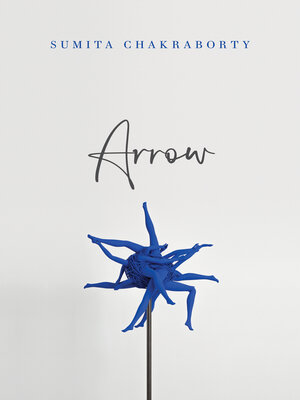
Sign up to save your library
With an OverDrive account, you can save your favorite libraries for at-a-glance information about availability. Find out more about OverDrive accounts.
Find this title in Libby, the library reading app by OverDrive.



Search for a digital library with this title
Title found at these libraries:
| Library Name | Distance |
|---|---|
| Loading... |
Contemplative poems write a contentious love letter to a flawed world.
"In poems that focus on gender and race-based violence, environmental destruction, and grief, Chakraborty investigates the unknown, unexpected, and unexplained." —Publishers Weekly
"About a quarter of the way through Sumita Chakraborty's Arrow, the reader encounters an impossible poem called 'Dear, beloved.' It's impossible because who could write it? It's as large, in its way, as any epic, but as compressed as any lyric, and as beautiful as any lyric, but as foundational as any epic, but it seems to come after all things, though it seems, also, diurnal. And it's impossible also because it's a highlight, not the highlight, of Arrow, a debut as assured as any first or last book, as compelling as any, as well-made." —Shane A. McCrae
"I stand in awe of Sumita Chakraborty's visionary collection, by turns epic and compressed in scope, weighty in its tapestry-like materiality and sleekly dynamic as an arrow. The mythic and literary, here, are invigorated by seeming autobiography, which in turn gains collective energy and heft from the poems' timeless tropes and themes. Seamless and diverse in form, cosmic in subject and image, one feels in the presence of an oracular intelligence and an abiding lyric imagination." —Diane Seuss
"This powerful and endlessly mysterious collection of poems is a book of fables, of spells, of revised narratives, and of realigned songs, brightly lifted above our bodies by music that is as unpredictable as it is marvelous. The lyricism is everywhere apparent as Sumita Chakraborty addresses us, our bodies and their stories, our planet, and our sense of time itself. How does she do it? Mad Ireland hurt him into poetry, W. H. Auden wrote about Yeats, and as the hurt enters Chakraborty's language, we see that in speech violated, sounds and meanings—and even the oldest of human mysteries, like 'the etymology of love'—are redefined. All one can do is repeat: this is an endlessly compelling book. Bravo." —Ilya Kaminsky







